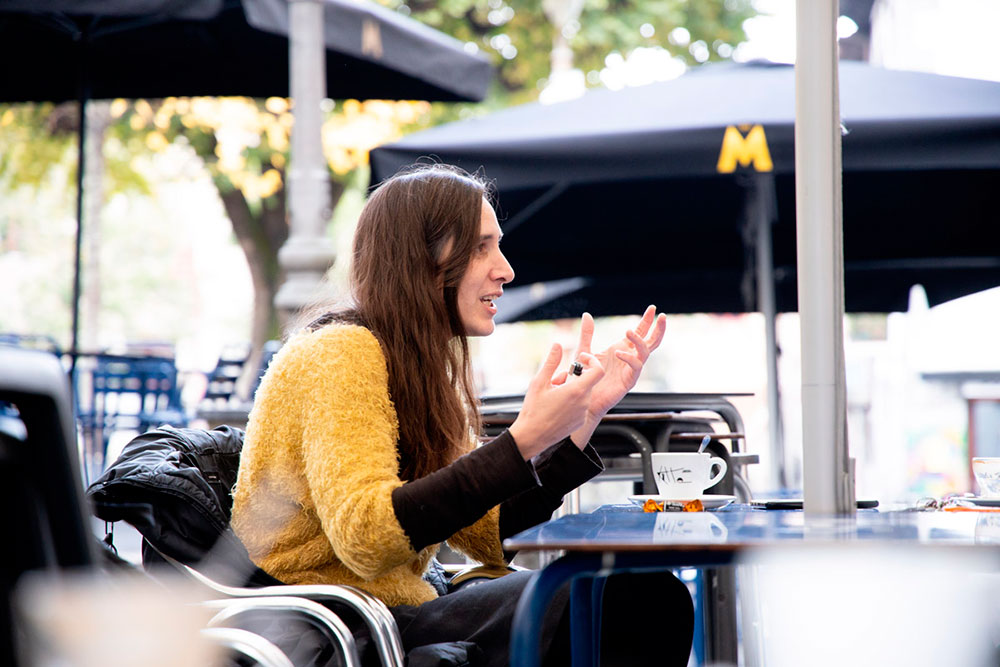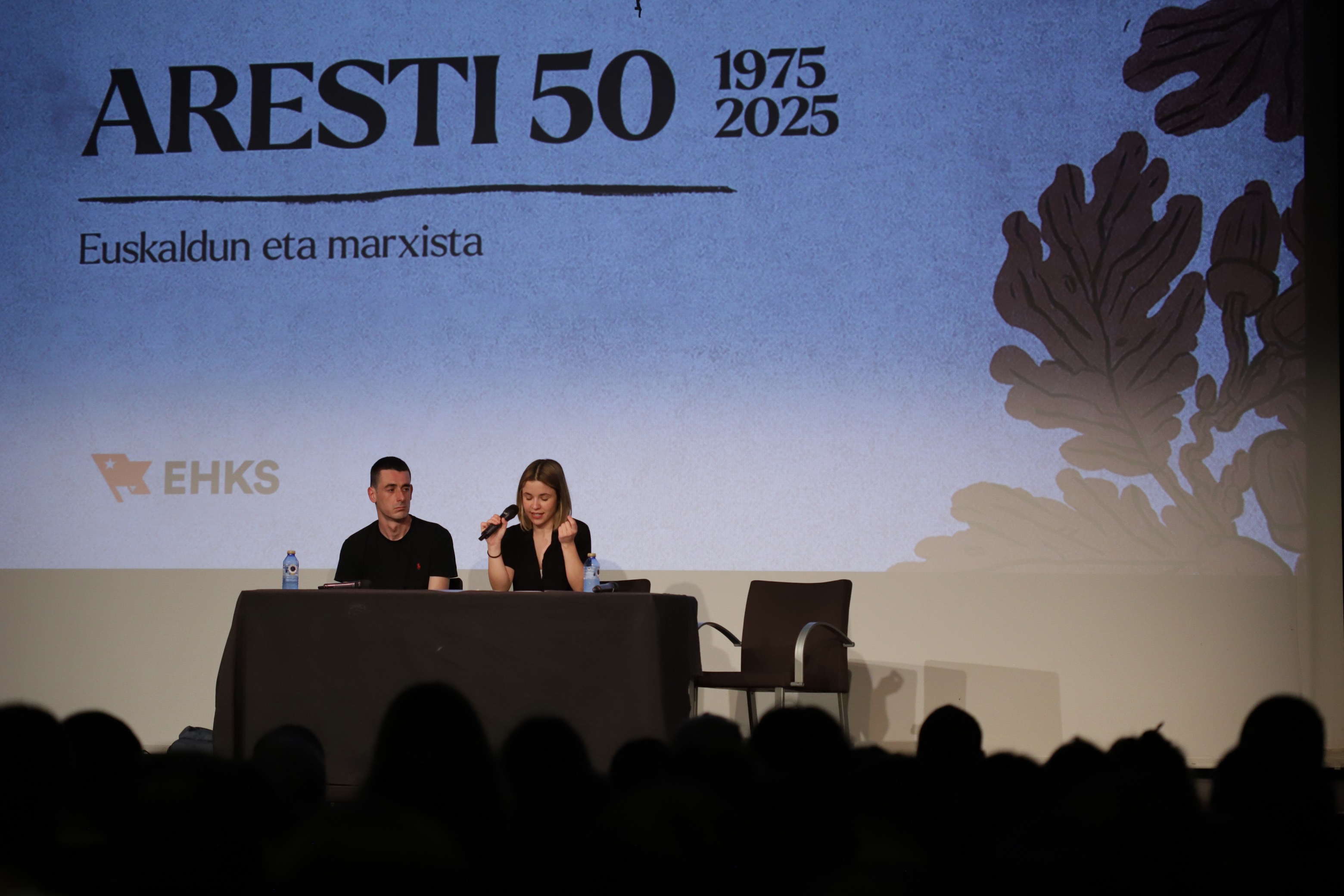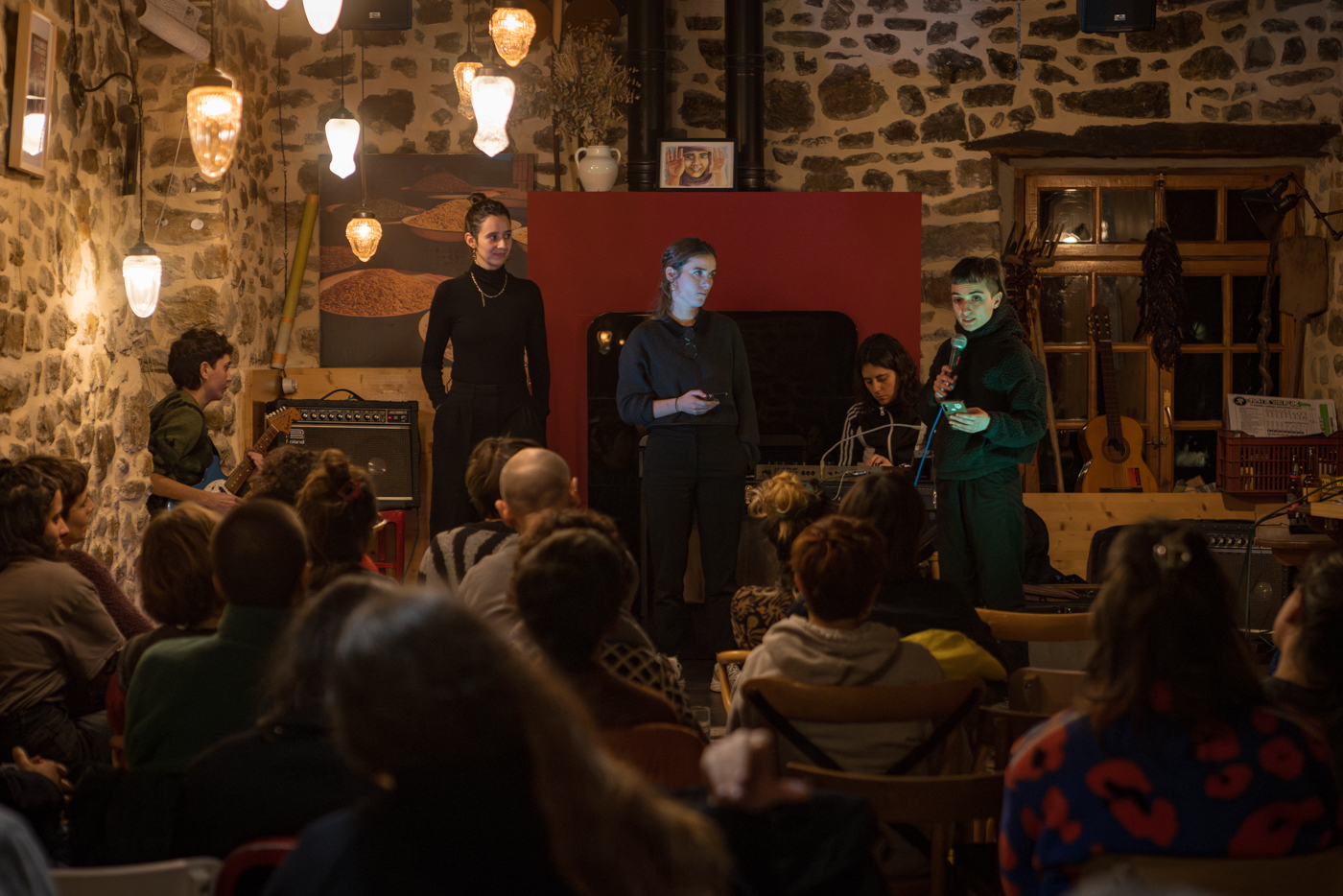“I don’t want to disguise myself as victims of my privileges”
- The platform of the Uxue Apaolaza Curve (Susa, 2021) collects nine stories written over ten years. Written in Madrid and ambited in Madrid, behind all is the same narrator, who vanishes in a constant tension: he has to comply with the standards established by society, or by his ideals, but weakness surpasses in daily life. The moral conflicts that occur between need and power permeate the book, obviously, without any constructive intention.

Uxue Apaolaza (Hernani, 1981) does not have time to write, and although in the book presentations he often sits “writer mushrooms” (the “mushrooms” are men who are just duked to the office, who appear in shirt and tupper), he says clearly: “I have written this book with the time of others.” The book project was presented to the Ignacio Aldecoa scholarship of the Provincial Council of Álava, to attend the advice of a friend and take care of the small child without a fixed plaza. “Having taken the job category writing upon receiving the scholarship, I could start asking for favors.” And until then he began to rewrite the stories he had left in the first draft, to fine-tune the structures, to unify the voices, to make the relationships between the stories, to stay at ease with the final result – or until the editor says “quito”.
“For me, writing is rewriting. At first there is a first blow, an image and a suspicion: this can be good, giving the possibility of taking something deeper from the anecdote from the breath. Then I start to fix that first draft, to cut it off, and in that process of rewriting comes the story.” As they are stories written for a long time, they have made a special effort to work individually: “I wanted every story to be legible as such. If not, when you start making ties, there can always be a story to get into the temptation that you may not include but makes sense with others. That was what I wanted to avoid.” All of them count the voice of the narrator Lur, who, despite his initial concern for being too monotonous, has tried to give variety from other aspects: “I have worked in the form of stories, or I have tried to make the voice always the same but not always the protagonist.” Now, when the book is on the street, it doesn't feel like the most appropriate person to talk about it. “What this book is has to be said by someone from outside. Or readers, or critics, but I don't." The author who publishes says that he can only wait, with great doubt: “Am I up to this diologist who is literature?”
The platform of the Curve consists of nine stories written over ten years and, despite this long period, have similar characteristics. In addition to the narrator or the locations, all of them located in Madrid, they share the point of view as a surprise to the world. In many stories, the other is a threat that is untrustworthy.
Yes, there is strangeness of the other, of the family or of oneself. Strangeness can be an abstract and philosophical issue, but it materializes in very concrete situations: here it's much easier to feel strange if you're black, or homosexual, or woman, or fat, or old. Those who do not comply with the standard feel more bizarre and even ridiculous. I'm interested in that leap: who doesn't comply with the norm, by empowering himself makes a mockery. A man shaving makes a wound on his face and goes quiet to the class. On the contrary, if I have blood between my legs, I make a mockery. You have to be very brave to hold the rcle, because all the epic ones need an audience that's a little guided to join you. The earth – the narrator – is moving along that road: I would like to make the circle as a sublime and revolutionary action, but often does not dare, because a revolutionary action is ridiculous action in the wrong context. Think about something and do the opposite.
It is not capable of complying with social standards, but it inevitably complies with them.
It's also about being older. If you're still a woman without children 50 years old, you won't be considered adults because you'll attend concerts and you won't meet the characteristics of an adult. Who is the adult? Whoever has a mortgage and a job, is married, has children. Unintentionally, other models are considered immature, because they seem to us to be more gamified and informal. Lu asks in a moment: When am I going to stop being a girl to be a woman? I'm 40 years old and they still call me girls, but I've noticed that since I've had a child I'm more adult in the eyes of some. And with class, the same thing: if you're below that middle class fiction, you have a lot of odds of being immature, because instead of going to restaurants you'll eat snacks, because you're not going to have a developed taste around the curtains to put at home. Maturity has to do with compliance with the standard.
"A revolutionary action is a ridiculous action in the wrong context"
This
sense of strangeness captures the Earth's relationships with others, as if it had a wall that can't be broken even with the closest ones.
Yes, and fear, because in the background he wants to be loved, and for others to think that he is someone of foundation. Something similar happens to me with writing: I'm very scared to read what I've written about you, because I think you're going to see something bad or bad that you don't normally see in me. Because I feel good, I go to work, I have direct opinions… and I do not agree with many things I think, but I think. Literature is for me the place of liberation of these aspects. Fiction doesn't hurt, it's protection for you and for the receiver. In fiction, it doesn't confirm anything, it raises something. Stories are costumes, lies that help you unlock some aspect of you, but by doing that, you're more truthful than ever. The limitations imposed by aesthetics are a space of freedom to tell a truth that you won't say otherwise, and that's why writing is so stimulating, because with this costume you can bring to the border things that you would say and you wouldn't do in everyday life.
Of course, there are also costumes you've never put in. I recently realized that in the book there is a very racist action, but it is not in the voice of the Earth, but in the voice of Leticia. To someone who is not a storyteller, I've put an action that I hate very much. I think it's been a psychological mechanism, because disguise tends to be a mockery, or a critic, or a satire. I'm really upset when men dress up as a woman on carnivals, because I think they're laughing from the top down. I do not want to disguise myself from the victims of my privileges: I cannot put myself in the mouth of a first-person refugee. I feel like an invader. But I'm going to ask what contradictions a middle-class target has in front of a refugee.

If nothing is worth fiction, where is the border between what is worth and what is not worth?
I don't know. But if I live with privileges earned on your own, I find it almost lustful that you then put me in your mouth to speak. There I feel a very clear limit. I'm not going to say that men can't speak in fiction through the mouths of women, but sometimes -- especially when the voice is the protagonist's voice -- I squeal, because we appear as a perfect feminist, or ...
"With a lot of things I think I don't agree with, but I think. Literature is for me the place of liberation of these aspects"
Why does the text itself fail?
Yes, but you notice it's written by a man. It is a very complicated exercise, because what you are treading is not a poor poor poor man. It has a mood against you or a way to call you among your friends. If I were to write from the voice of a migrant woman, what would I imagine? Super working woman, always worried about her children... I think it's very difficult.
In the presentation of the book Ibon Egaña spoke of his moral but not moralistic literature. Are there conscious attempts not to fall into moralism?
I'm an atheist, I'm not baptized, but I think I'm a very moral person. God forgives a Catholic, but who? I don't have a legitimate authority, I'm alone with myself. I think that's being an adult. If you are able to forgive yourself – something you have to learn – well. But I'm not very sympathetic to myself, not even Lur. I try not to get involved in my stories, because it bothers me when they speak to me in that tone. “You’re always going to Benidorm in summer!” Well, yes, I don't have a vans to go to the Pyrenees. Now we go to poor hotels, and whoever has some money buys a van. On this issue it is antidote to make a continuous self-evaluation, questioning the class itself, the origin of each one… Instead of suppressing outward, making a moral reflection inwards – and surely someone will feel challenged –. If I have to live in a male chauvinist system consistent with feminism, I may not leave the house, and if I leave, I will have moral conflicts and contradictions. The same with class, we had to be a middle class, a fiction that our parents believed, and we've stayed in precariousness. However, when we go to the poorest we can do “safari life”, because the support of the parents does not allow us to fall completely. The nice part of stories is that: you can cross many dimensions in an esthetic artifice, bringing them to a category beyond the anecdote.
But it's not constructive.
To do this, you have to feel way above the reader, and the reader I imagine is much faster than I am. In addition, I think it has its ideology, which knows what it feels good and how bad it is, whether it is socialist, whether it is a feminist, or what. I find it difficult to give lessons because I use literature to the exact opposite. The literature that interests me is not the one that makes statements, but the one that questions the discourses made and the collectives from an individual perspective. Because these collective discourses are held on a daily basis on very vulnerable people. We are individually very weak, because somehow we have to survive. Stories are often called complicity: “Help! Does anyone understand me?”
"God forgives a Catholic, but who? I don't have a legitimate authority, I'm alone with myself."
When literature generates cracks, does it from individuality?
My literature is individual, but an individuality in permanent collision with the collective. And, whether you like it or not, there's always politics, not because it pretends to give a political message, but because the character has a position, a way of looking at the world. I also think it is good to give speeches: I really like pamphlets, but not in my stories. And then I find it great that people criticize from a feminist, materialistic or aesthetic point of view. It bothers me when the writer says how I have to understand his book, either orally or in the text itself. “This book is a feminist.” Well, I'm going to tell you. Writers are not the most appropriate to talk about our books. You give the reader an artifact, and what he receives from there is what remains, nothing else. I think it is good that there is literature that says how good we are, but to me writing is a selfish act: I want to spread my obsessions and I need accomplices – those that do not surround me. From there I understand publishing, for example: that my book is complicit with someone, but not to show something, but to make someone feel: “Look, this is my friend.”

You believe that moral issues are also political.
Here we have heard a speech for many years: “Politics is not moral, politics is strategy.” And of course, when you're in activism, you have to have strategic planning, a truth, a speech, a belief and a roadmap. But collective strategies leave many individuals on the road, hurt, marginalized, for a thousand reasons. When the collective collides with the individual, a moral conflict emerges that has always interested me, of course, for literature. On the other hand, I believe that the moral aspect is also a way of refining these collective strategies, and that is why I do not like this discourse that politics is a mere strategy.
There is also no lack of moralistic discourse in politics.
I believe that we can contextualize moral conflicts. When someone says “stealing is wrong”, no. As the case may be, it may be bad, but at least in absolute terms it is not, it is probably good in most cases. That is why I say that wanting to open cracks in the literature does not mean that you want to nullify that speech. I do not want to deny any speech, but to raise some doubts. In short, writing stories is a “pijada”. To launch concrete messages, you can tell them a lot cleaner in a pamphlet. If you lose time in the literature game, it's not just because your message is interesting. Since I decided to publish the book so far, I haven't worked the messages; the rhythm, the tension, the form has been what I've rewritten. That's what's central to literature.
You published Umeek menturra sixteen years ago. What has changed the literary world since then?
When I started writing, it seemed like my only value was being a woman. But no one is a writer just for being something, I'm a writer because I'm a reader. Many of the things I've written now would be the little things about girls a few years ago. Sartre thought it was a universal question whether he knew his hand or not, and that we were all interested in it. Our things, on the other hand, just us. Women learned to read men for long years, and now we've taken a big step: it's not that men have learned to read women, but we don't care so much anymore. It has been observed that women are not dedicated exclusively to reading romantic novels, but are empowered educated readers. Before you could despise them more easily, now you have to keep them in mind and when you write you already know they are there.
In any case, our evolution is not exclusive to ours. If I cannot write as if Bukowski had not written, today's men cannot write as if they had not written Eider Rodríguez or Uxue Alberdi, to name two who are in the canon today. Feminism has become central, not only in literature, but also in society. You can't avoid it, not even being a man. It goes through everything.
Astelehen honetan hasita, astebetez, Jon Miranderen obra izango dute aztergai: besteren artean, Mirande nor zen argitzeaz eta errepasatzeaz gain, bere figurarekin zer egin hausnartuko dute, polemikoak baitira bere hainbat adierazpen eta testu.
Martxoaren 17an hasi eta hila bukatu bitartean, Literatura Plazara jaialdia egingo da Oiartzunen. Hirugarren urtez antolatu du egitasmoa 1545 argitaletxeak, bigarrenez bi asteko formatuan. "Literaturak plaza hartzea nahi dugu, partekatzen dugun zaletasuna ageri-agerian... [+]
1984an ‘Bizitza Nola Badoan’ lehen poema liburua (Maiatz) argitaratu zuenetik hainbat poema-liburu, narrazio eta eleberri argitaratu ditu Itxaro Borda idazleak. 2024an argitaratu zuen azken lana, ‘Itzalen tektonika’ (SUSA), eta egunero zutabea idazten du... [+]






















